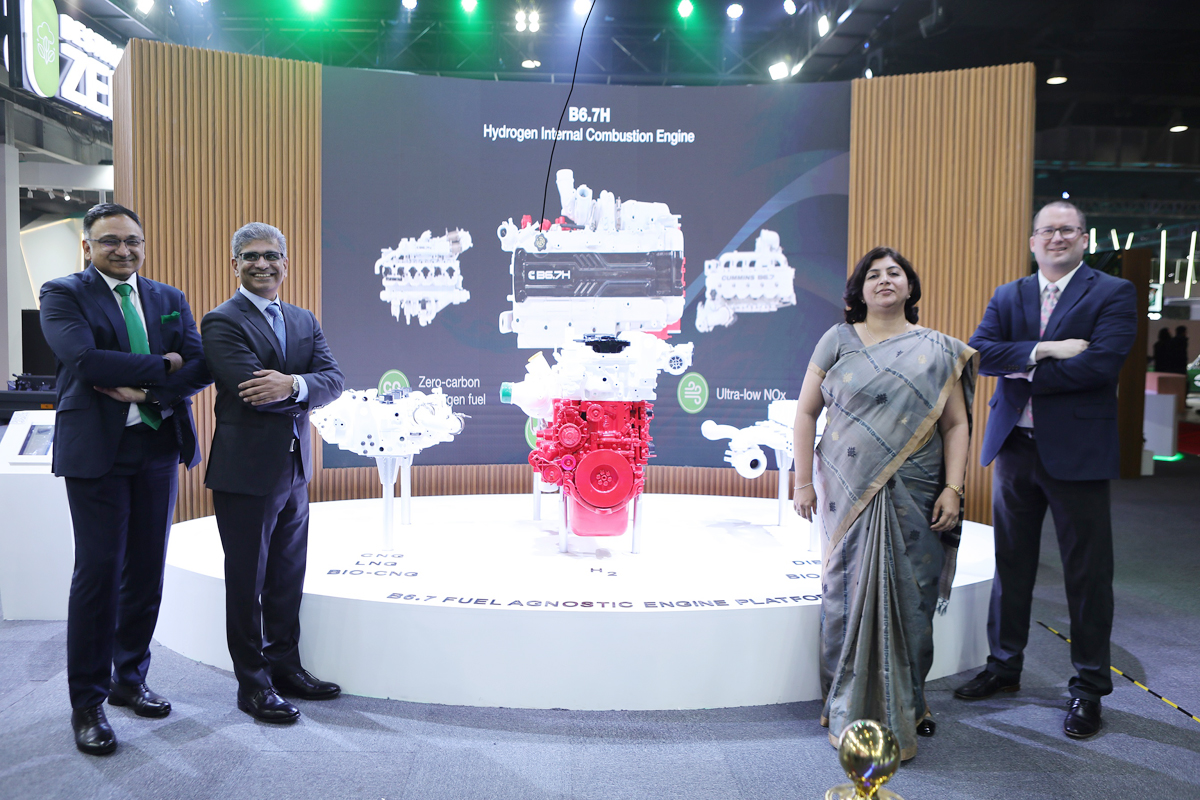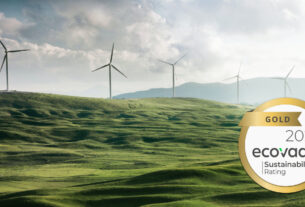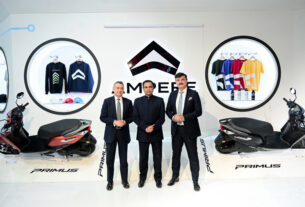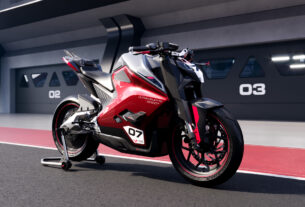Cummins Group in India, leading power solutions technology provider, unveiled Commercial Vehicle Industry’s first Fuel Agnostic Platform and its diversified range of Hydrogen Technologies power solutions at Auto Expo 2023 in India Expo Mart, Noida.

From left, Ashwath Ram, Managing Director, Cummins Group in India, Srikanth Padmanabhan, President – Engine Business, Cummins Inc., Anjali Pandey, Chief Operating Officer, Cummins Group in India, and Brian Wilson, New Power Global Leader, Cummins Inc., unveiled Industry’s first fuel agnostic platform and diversified range of Hydrogen Technologies power solutions at Auto Expo 2023.
At the product launch event organized in the Cummins Group in India booth situated in Hall Number 15 of AUTO EXPO 2023, the company brought its Destination Zero™ strategy to life by unveiling low-zero emission products focused on decarbonization. The launch event was presided by senior officials from Cummins Inc. and India where the leadership team reinforced that Cummins is actively working to transition its customers to products that ultimately eliminate carbon emission and will have the right products to serve customers throughout the transition.
With over a century of experience as a global power leader and a 6-decade presence in India, Cummins is solidifying its commitment of providing comprehensive zero-emissions technology along with other intermediate low carbon solutions on a global scale. Its multipath decarbonization approach is based on the premise that adoption of new technologies must address diverse customer needs such as power requirement, payload, range, and total cost of ownership economics, along with infrastructure and resource availabilities. Hence, rather than a one-size fits all solution, Cummins believes there are multiple approaches and technologies that can help in progressing toward the net zero goals.
Speaking at the launch event, Ashwath Ram, Managing Director, Cummins Group in India, said: “We share India’s vision of ‘Energy for Sustainable Growth’ and achieving net zero carbon emissions by 2070. With a promising combination of our strong, global technological expertise and our deep understanding of the India market due to our 60 plus years legacy, we are well positioned to contribute toward India’s aim of becoming a cleaner and greener ‘Atmanirbhar Bharat’. We understand that the road transport sector has a major role to play in helping reduce emissions so India can meet its climate goals and we are deeply committed to play our part in powering nation’s decarbonization journey. Our innovation can be seen in action through the range of solutions on display at AUTO EXPO this week and it reaffirms our commitment to Decarbonization. We will continue to work together with our stakeholders on low carbon and zero emissions solutions that further our shared goal of reducing our carbon footprint on the planet.”
Srikanth Padmanabhan, President – Engine Business, Cummins Inc., said: “Realizing a net-zero future will require a range of technologies and no one understands that better than Cummins. Our Destination Zero strategy considers the significant diversity of applications in our industry. We power some of the world’s most demanding and economically vital applications. There is not a single solution or path to zero that will work for all these applications considering the variation in duty cycles and operating environments and locations. We must advance solutions in a way that secures a sustainable future for the industries that keep the world running. That’s why we have developed the broadest range of ultra-low and zero-emission technologies dedicated to the commercial vehicle industry, which is being showcased at the AUTO EXPO.”
Destination Zero™ is part of the framework of Cummins’ broader PLANET 2050 environmental sustainability strategy, which also includes a focus on improving the communities the company operates in and using natural resources in the most responsible way.
At the Auto Expo, Cummins is showcasing the following solutions that demonstrates its commitment to power India’s net zero ambitions and enable its customers in their energy transition journey.
Innovative Fuel Agnostic Platform Engine
Cummins is showcasing its fuel agnostic platform, demonstrating a practical way to reduce emissions now using technology that OEMs, fleet managers and operators are familiar with.
As we move towards decarbonization, we would need to work upon multiple technologies leveraging the currently available options of low and zero carbon fuels. This will provide options to the end users and give flexibility of adoption of them based on infrastructure availability, needs of the transport operations and yet optimizing economics of the transportation.
The fuel-agnostic architecture utilizes a common base engine with cylinder heads and fuel systems specifically tailored to fuel ranging from diesel, natural gas, renewable natural gas, and hydrogen. The platform offers OEMs common engine architecture across multiple fuel types resulting to a high degree of parts commonality.
At the Auto Expo 2023, the fuel-agnostic platform concept is demonstrated through:
Move to Zero Carbon Fuel (Innovation in ICE Technology – Fuel Agnostic Platform)
- Hydrogen Internal Combustion Engine (B6.7H Engine)
Part of the fuel agnostic platform is what could become the most practical to reaching zero-carbon emissions for medium- and heavy-duty truck manufacturers – Cummins’ hydrogen internal combustion B6.7H engine. When paired with green hydrogen, this engine produces zero Well-To-Wheel CO2 emissions. Moreover, it has an industry leading 700 bar Hydrogen tank that enables quick refueling.
With the B6.7H engine, Cummins has addressed the medium- and heavy-duty trucks and buses segment, thus highlighting the technology’s ability to support decarbonisation across multiple duty-cycles.
Immediate shift to Low – Carbon Technology
- Natural Gas Internal Combustion Engine (CNG / LNG / Bio-CNG)
Natural gas engines help lower emissions and reduce a vehicle’s overall environmental impact without sacrificing the performance needed to get the job done. Natural gas engines are also the most mature, proven and least disruptive alternative power technology available today. Natural gas infrastructure is available and accelerates the government vision of increasing natural gas share in energy mix from 6% to 15% by 2030. Significant investments are already planned to build the infrastructure both on CNG and LNG, and this technology will help achieve the government’s vision
Cummins’ B6.7H Natural Gas Internal Combustion Engine is the industry’s first big bore natural gas engine, purpose built to support CO2 emissions reduction in long distance trucking, upto 10% Co2 reduction achievable for CNG / LNG over a Diesel truck and upto 75% Co2 reduction achievable when used with Bio-Gas thus improving air-quality as per BSVI compliance and capability of Euro VII too.
Switch to the latest generation Diesel technology
- Advanced Diesel (B6.7 Diesel / Bio-Diesel)
With a foundation of almost 700,000 Euro VI, low-emission engines supplied, Cummins showcased its latest-generation advanced diesel platform. Cummins’ advanced diesel B6.7 engines give customers the opportunity to reduce emissions alongside significant improvements in power and torque as they are built on industry’s first fuel agnostic platform, compliant to BSVI OBDIII emission norms.
Innovative Zero-Emission Solutions
- Electrolyzer (for Green H2 Generation)
Electrolyzer takes the water as input and splits it into Hydrogen and Oxygen as output. When supplied with Renewable energy the H2 generated is called as green H2 since the process doesn’t have any carbon footprint. Cummins has supplied and commissioned more than 600 electrolyzers worldwide with PEM and alkaline technologies. Cummins displayed a modular variant of the state-of-the-art electrolyzer-stack technology at the Auto Expo.
- Hydrogen Fuel Cell
Cummins’ latest generation fuel cell engine will showcase the rapid evolution of our zero-emissions technologies. For customers that need and want to reach zero greenhouse gas emissions today, hydrogen fuel cells would be an apt solution when supplied with green H2 as fuel. Building on the deployments of more than 2,000 fuel cells globally for various applications including bus, truck, stationery power and railways, this next generation product provides improved power density, efficiency and durability and is available in single (rated power – 125kW) and dual module (rated power – 240kW) engines for both medium- and heavy-duty vehicles that can work in diverse working environments from -30 °C to 45 °C with 60% peak efficiency.
- Battery-electric Technology (Battery-LFP and NMC)
Drawing on deep duty cycle and application experience, Cummins has developed the new generation battery pack solutions. Cummins is showcasing multiple batteries that help the customers to reach zero-emissions today. These Lithium ion batteries are with distinct chemistries like Lithium Iron Phosphate (LFP) and Nickel Manganese Cobalt (NMC) that optimizes to serve diverse needs of charging time, weight, range and cost economics of variety of applications in the market. Cummins batteries are equipped with advance Battery Management System (BMS) for monitoring various critical battery parameters, diagnostics and improve the battery life & performance.
- Electric Powertrain Technology (14Xe ePowertrain)
Cummins recently announced its acquisition of Meritor, a leading global supplier of drivetrain, mobility, braking and electric powertrain technologies. The addition of Meritor strengthens Cummins’ industry-leading range of powertrain components and will enable accelerated development of electrified power solutions. Together, Cummins and Meritor will move further and faster in developing economically viable decarbonized powertrain solutions that advance Cummins’ Destination Zero strategy.
The 14Xe ePowertrain is designed for scalability and can be adapted to fit various electric powertrain needs based on the vehicle application and duty cycle. Its design provides high-efficiency, lower weight and better turning radius. Thus it enables, longer vehicle range by integrating the motor and transmission into the axle, thereby freeing up space for more batteries.




